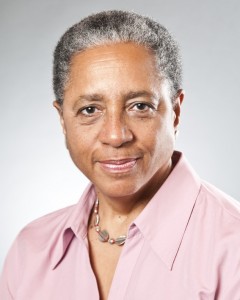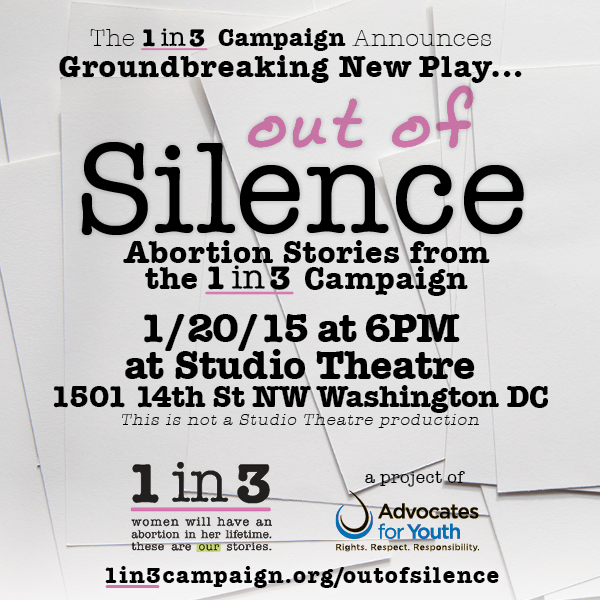 In preparation for Advocates for Youth’s world premiere production of Out of Silence: Abortion Stories from the 1 in 3 Campaign, I had a chance to speak with playwright Caleen Jennings, author of BRANDI AND THE BEAR, about her writing process, inspiration for the play, and the power of theatre to serve as a tool for social advocacy. Please enjoy this wonderful interview!  JACQUELINE LAWTON: Why was it important for you to be a part of Advocates for Youth’s Out of Silence: Stories from the 1 in 3 Campaign? CALEEN JENNINGS: I was honored to be included among the invited playwrights. I have known several women who have had abortions. It is a decision that has huge emotional, psychological or physical implications. I have never known a woman to take it lightly. Too often the media and anti-abortion advocates portray those who advocate the right to choose, as well those who have had abortions, as being Godless, promiscuous, and callous women who treat abortion as a form of birth control. I don’t know any women like this. I want young women to see a range of women and a range of options. I want them to be able to identify with the positive characters I try to create. JL: Tell me about the play(s) that you wrote? What inspired it? CJ: My story was #1615. What struck me was how this young girl had a series of bad breaks and had received misinformation. Her home life was difficult and she sought comfort the best way she knew how. She put her trust in someone who was as clueless as she was. Both of them were kids. The thing that leaped off the page for me was the fact that on the day of her abortion, her boyfriend brought her a teddy bear. This is a very young guy who’s not necessarily a villain. He’s immature and irresponsible, yes, but he’s not without a heart. He brings her a teddy bear because he thinks it will make her feel better, not understanding the incredible emotional and physical pain that a teddy bear will never erase. I could very much see my 16 year old self in this narrative. I was lucky because my home life was great. Both my parents were very supportive and very aware of what I was doing. My mother made sure I knew about the birds and the bees and she watched me like a hawk. What touched me most about Story #1615 can be summed up simply: There, but for the grace of God, go I. JL: What was it like to turn this story into a play? What was your process? What research, if any, did you do? CJ: It was tough, I spent a lot of time reading and re-reading the original story. In the story, the young woman shares her thinking process. I had to turn her thinking on the page into doing(action) for the stage. From the very beginning, I knew I didn’t want a realistic scene, I wanted it more presentational. I wanted to see if I could elevate this very personal, youthful narrative to something bigger. I wanted to show how complex a young woman is – the many sides of her psychic make-up. In the first draft, I had four characters, because I had not read the guidelines correctly. So I had to take the same idea and make it work for two characters. I did some reading on abortion, especially on the physical and emotional symptoms women are likely to experience after having one. It struck me that she stayed with her young man for six years, although he continued to cheat on her. She matured, he did not. I wanted the play to end with her self-actualization. In the first draft, that included marriage. I was advised that too many of the plays were ending in marriage, and I was asked to find another alternative. My play ended with her owning of herself and being at peace. JL: What role does theater have in advocacy work? CJ: Theatre is a very, very powerful tool in advocacy work. To see your own story on stage is life-affirming. To be able to feel empathy for someone else, particularly someone who is very different from you, or a type of person you had previously viewed with apathy or antipathy, is extraordinarily powerful. To change minds, to make people feel, to validate people – that is the power of theatre. It is not to be taken lightly. JL: What are you working on next? Where can we follow your work? CJ: I just closed a play entitled Not Enuf Lifetimes at the Atlas Performing Arts Center in Washington D.C. One can learn more about that from my playwright’s collective website: www.thewelders.org. I am working on a short piece about the Michael Brown case, as well as a short radio piece about D.C. Statehood. Unfortunately, I don’t yet have a website.
0 Comments
Your comment will be posted after it is approved.
Leave a Reply. |
My BlogI'm a playwright, dramaturg, and teaching artist. It is here where you'll find my queries and musings on life, theater and the world. My posts advocate for diversity, inclusion, and equity in the American Theatre and updates on my own work. Please enjoy!
Categories
All
Archives
June 2020
Reading List
|

